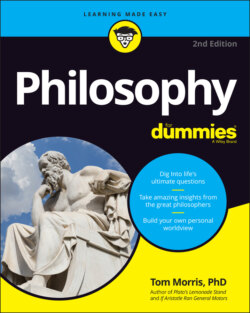Читать книгу Philosophy For Dummies - Tom Morris - Страница 30
UNDERSTANDING THE DANGERS OF ARGUMENT: A GUIDE
ОглавлениеHow can you actually use argument well and maybe even make progress in an argument with another person — or at least not get your shorts all twisted and wind up with an intellectual wedgie? You can find all sorts of advice on this subject from throughout the centuries. A bit of the advice is philosophical, some of it is psychological, and part of it is just plain pragmatic.
First is the very practical advice, such as, “In arguing, answer your opponent’s earnest with a jest and his jest with earnest,” given to us by the witty word warrior Leontinus Gorgias (as quoted in Aristotle’s Rhetoric). In other words, keep the person with whom you’re arguing off balance. Know when to joke, and when to be serious. Be unexpected. But this practice is indeed a subset of rhetoric, which is the art of persuasion, and not of philosophy, which is a determined search for the truth. Most of the pragmatic advice available about argument presupposes precisely that you’re after a win more than the truth.
The psychological advice offers cautionary reminders most often about the limits of argumentation in dealing with another person and the truth at the same time. Sir Thomas Browne, for example, warned, “In all disputes, so much as there is of passion, so much there is of nothing to the purpose.” Debate, you often hear, typically generates more heat than light. You should know that likelihood going in. Passion clouds reason. And in the context of an interpersonal argument or debate, people sometimes are willing to do anything to save face. Joseph Addison once observed, “Our disputants put me in mind of the scuttlefish, that when he is unable to extricate himself, blackens the water about him till he becomes invisible.” It’s a sad but common reality. So, as Publilius Syrus concluded long ago, “In a heated argument, we are apt to lose sight of the truth.”
Finally, some modest philosophical advice of a practical bent: Protagoras may have been the first to affirm that every major question has more than one side. And Henry Fielding added in the 18th century that, “Much can be said on both sides.” Whenever you see sincere, intelligent people supporting a cause or arguing a point of view, you can expect as a maxim of common sense to find more than just sheer foolishness in that position or cause. By extrapolation, it can be said that, in all the history of philosophy, with all the competing schools of thought and opposed points of view, you’re never going to come across large numbers of sincere, intelligent, and relatively well-informed people who are just completely wrong in every way. So, always try to remain open-minded and look for the truth that any opposing view may capture. On the other hand, Oscar Wilde sought to warn us, with more than a bit of hyperbole, that “The man who sees both sides of a question is a man who sees absolutely nothing at all.” Neither reason nor common sense dictates or even advises that we should aspire to balanced indecision anywhere in life.
And, of course, life consists of much more than argument. Socrates once remarked, “You are fond of argument, and now you fancy that I am a bag of arguments.” As you make your way in the world, you don’t want to avoid argument, and yet neither do you want to constantly seek it out as the only thing in life worth your time. So, please, remind yourself and your undergraduate philosophy-major friends: Not even Socrates was just a bag of arguments.
Of course, people can often reasonably differ on a piece of evidence cited in an argument, or they can blind themselves to the truth and even refuse to listen to rational considerations at all. The best intellectual reasoning can fail completely to overrule strongly opposed passions.
Emotion and logic are sometimes at odds. But that doesn’t mean it isn’t important to learn to reason well. The point now is simple and vital to grasp.
Argument is essentially about deliberation and discernment before it’s about persuasion. Its aim is understanding. In the right context, the ability to argue cogently can prove of great importance for seeing yourself where the truth is to be found, and then later perhaps convincing others to join you in its pursuit. Good argument isn’t always guaranteed to produce the good result you may desire, but good argument is better than bad argument any day of the week. And a well reasoned argument, along with imagination and emotion, can provide part of a total case for enlisting the whole person in seeing or acting on an important truth. Rational argument is one of the most distinctive of genuinely human abilities, and it’s one strongly cultivated by philosophy.
